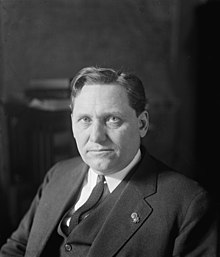|
1932 United States Senate election in Iowa
The 1932 United States Senate election in Iowa took place on November 8, 1932. Incumbent Republican Senator Smith Brookhart, a controversial progressive figure within the conservative Iowa Republican Party, was defeated in the June Republican primary by Henry A. Field. Field was in turn defeated in the general election by Democrat Louis Murphy. Brookhart also entered the general election as the candidate of the Progressive Party but finished a distant third. Primary elections were held on June 6. Field defeated Brookhart in the Republican primary, and Murphy defeated a four-man Democratic field including former senator Daniel F. Steck and future governor Nelson G. Kraschel. Murphy's victory made him just the second Democratic senator from Iowa elected since 1852 and the first to win election directly.[a] He was first elected to this seat since 1855. Background Senator Smith W. Brookhart was first elected to the Senate in 1922, winning a special election to succeed William S. Kenyon.[1] After joining the Senate, Brookhart's "pugnacious cowhide radicalism nettled patrician Senators."[2] His indifference to President Calvin Coolidge in the 1924 presidential election also upset conservatives.[3] In 1924, he attempted to win re-election to a full term, and it initially appeared he had narrowly defeated Democratic nominee Daniel Steck despite the defection of many conservative Republicans. However, Steck challenged the result in the U.S. Senate and, during a lengthy process, the Iowa Republican Party sided with Steck. Brookhart was removed from office on April 12, 1926 and replaced with Steck by a vote of 45–41. A dozen Senate Republicans voted with Democrats to unseat Brookhart.[3] Immediately upon his ouster from the Senate, Brookhart returned to Iowa and challenged the incumbent Republican Senator for Iowa's other Senate seat, Albert B. Cummins, a respected veteran of the Senate. Brookhart defeated Cummins in a landslide, despite having little time or resources to mount a campaign, and was returned to the Senate in the fall in another landslide victory.[4] Republican primaryCandidates
CampaignThe first prominent challenger to Brookhart was George Cosson, a former Iowa Attorney General. In February, Brookhart accused Cosson of being "personally conducted" by Federal Reserve Bank chair Eugene Meyer, whose confirmation Brookhart had opposed.[9] "This is simply an illustration of the political machine Wall Street is attempting to build up for the control of all the states through the federal reserve banking system, the federal land bank system, the joint stock land bank system and the intermediate credit bank system," said Brookhart. Brookhart further accused Meyer of bankrupting the nation's farmers and proposed instead a direct subsidy.[9] Cosson declined to respond to the accusation.[9] Henry Field, a successful agribusinessman and radio station owner, entered the race in March in response to a draft effort by more conservative Republicans.[7] He, Cosson, and Cook were soon joined by Glenn Haynes, a former state auditor and secretary of the Iowa Good Roads Association.[8] Eventually, conservatives joined in support of Field as the best alternative to Brookhart. In addition to traditional conservative lines of attack, Field criticized the Senator for missing sessions while on vacation and for the number of his relatives who held federal positions.[10] Results
Democratic primaryCandidates
Results
After losing the primary, Kraschel was nominated to run for Lieutenant Governor of Iowa. General electionCandidates
Results
See alsoNotes
References
|
||||||||||||||||||||||||||||||||||||||||||||||||||||||||||||||||||||||||||||||||||||||||||||||||||||||||||||||||||||||||||||||||||||||||||||||||||||||||||||||||||||



